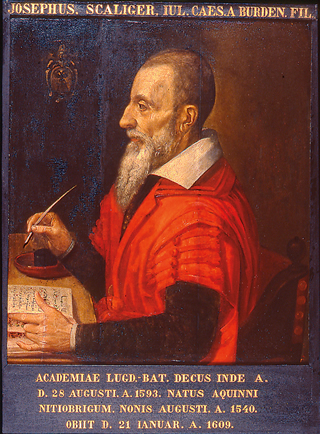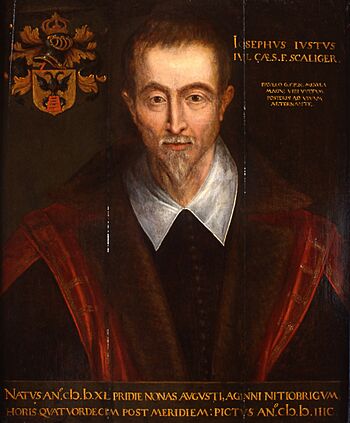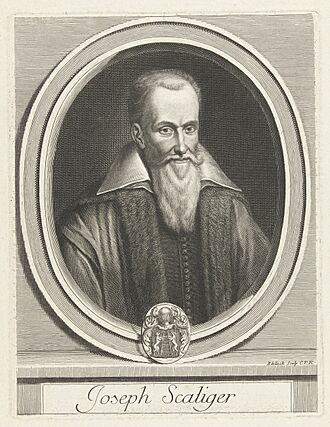Joseph Justus Scaliger facts for kids
Joseph Justus Scaliger (born August 5, 1540 – died January 21, 1609) was a famous French-Italian scholar and religious leader. He was known for changing how people thought about ancient history. Before him, many only focused on Greek and Roman history. Scaliger showed that Persian, Babylonian, Jewish, and Ancient Egyptian history were also very important. He spent the last 16 years of his life in the Netherlands.
Contents
Early Life and Learning
Joseph Scaliger was born in Agen, France, in 1540. His father, Julius Caesar Scaliger, was a well-known scholar and doctor. Joseph only had three years of formal schooling at the College of Guienne in Bordeaux. This stopped in 1555 because of a serious outbreak of the bubonic plague.
After that, his father taught him at home until he passed away in 1558. His father made him write at least 80 lines of Latin every day! This strict training helped Joseph become a great scholar.
University and Exciting Travels
After his father's death, Scaliger spent four years at the University of Paris. He started learning Greek there. He was so good that he read all of Homer in just 21 days! He then read many other Greek writers and taught himself grammar. Later, he also learned Hebrew and Arabic. He became very skilled in these languages too.
One of his most important teachers was Jean Dorat. Dorat helped Scaliger become friends with Louis de Chasteigner, a young lord. In 1563, Scaliger traveled with Louis. They first went to Rome, Italy. There, Scaliger met many important people.
After visiting much of Italy, they traveled to England and Scotland. Scaliger didn't have a good impression of the English people. He felt they were not very welcoming to foreigners. He was also disappointed that he found only a few Greek writings and not many scholars there. During his travels, he became a Protestant.
Life in France and Geneva
When Scaliger returned to France, he lived with the Chastaigner family for three years. In 1570, he went to Valence to study law with a famous legal expert, Jacques Cujas. He learned a lot from Cujas's huge library, which had hundreds of old manuscripts.
However, a terrible event called the St. Bartholomew's Day massacre happened. This made Scaliger, like many other Huguenots (French Protestants), flee to Geneva. There, he became a professor at the Academy of Geneva. He taught about Aristotle and Cicero. Even though his students liked his lectures, Scaliger didn't enjoy teaching much. He also didn't like the strict religious leaders there.
So, in 1574, he returned to France. He lived with the Chastaigner family for the next 20 years. During this time, France was in a civil war. Scaliger often had to move around and sometimes even helped as a guard. He didn't have easy access to libraries or even his own books. But he had something many scholars didn't: free time and no money worries.
Revolutionizing History and Time
During this period, Scaliger wrote and published many important books about history. He was the first to create clear rules for studying and correcting old texts. He changed how people looked at ancient writings, making it a more scientific process.
His most important works were his book on Marcus Manilius (1579) and his book De emendatione temporum (1583). These books completely changed how people understood ancient chronology (the study of time and dates). Scaliger showed that ancient history wasn't just about the Greeks and Romans. It also included the Persians, Babylonians, Egyptians, and Jews. He said that all these different histories and their ways of tracking time needed to be compared carefully. This idea was very new and made him stand out from other scholars.
In his book De emendatione temporum, Scaliger explored how ancient people measured time, created calendars, and calculated dates. He used the ideas of modern scientists like Nicolaus Copernicus to explain these old systems.
In the last 24 years of his life, he continued this work. He managed to rebuild a lost ancient document called the Chronicle of Eusebius. This was a very valuable text for understanding ancient timelines. He published it in 1606 in his Thesaurus temporum, where he gathered and organized all the old time-related records he could find.
Life in the Netherlands

In 1590, the University of Leiden in the Netherlands wanted Scaliger to join them. He didn't want to at first because he disliked lecturing. But the university invited him again, promising he wouldn't have to teach and could use his time as he wished. Scaliger accepted this special offer.
In 1593, he moved to the Netherlands and stayed there for the rest of his life. He never went back to France. He was welcomed warmly in Leiden. He received a good salary and was highly respected. He was also known for being a good conversationalist and enjoyed social gatherings.
For the first seven years in Leiden, Scaliger was at the peak of his fame. Everyone respected his knowledge. He was like a king in the world of scholars. Many young students wanted to learn from him. He encouraged young Grotius, who was only 16, to edit an important book. Daniel Heinsius became his closest friend and student.
However, Scaliger also made many enemies. He hated ignorance and dishonesty in academic work. His sharp comments and writings often upset people. He knew he was powerful and wasn't always careful with his words. Sometimes he made mistakes too, as he relied a lot on his memory.
Challenges and Final Years
Scaliger's new ways of looking at history challenged some traditional beliefs, especially those held by Catholic scholars. The Jesuits, a powerful Catholic order, saw Scaliger as a threat because he was a strong Protestant and a leading scholar. They tried to attack his reputation.
In 1607, a book called Scaliger Hypobolimaeus was published. It claimed that Scaliger was lying about his family history and that he wasn't from the noble La Scala family of Verona. This attack deeply hurt Scaliger. He had always believed he was a prince of Verona, based on what his father told him.
He wrote a reply called Confutatio fabulae Burdonum. Some people thought his reply was very good, but others felt he didn't fully prove his family's noble background. This book was Scaliger's last work. Five months after it came out, on January 21, 1609, he passed away in Leiden. He left his amazing collection of foreign language books and manuscripts to Leiden University Library.
Images for kids
See also
- History of scholarship
- Julian Period – a system of years proposed by Scaliger
- New Chronology (Fomenko)





